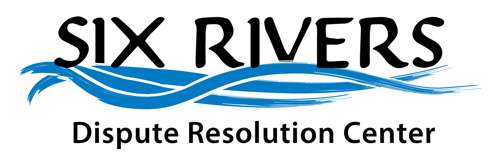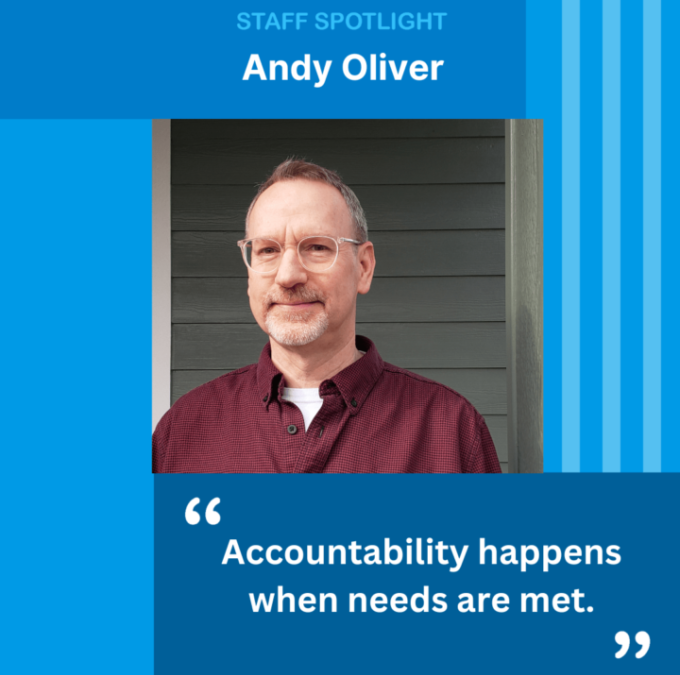Andy Oliver joined the Six Rivers team in September of 2022 as our first ever Restorative Justice Apprentice. Andy made such an impression about his passion for Restorative Justice (RJ) at his interview for a Mediation Apprentice position that Six Rivers requested additional funding for a Restorative Justice Apprentice. The Oregon Office of Community Dispute Resolution at the University of Oregon Law School agreed to the funding. Andy not only works with Six Rivers as the RJ Apprentice but also works with Lutheran Community Services providing crime victim services.
Andy majored in Criminology because he thought he wanted to be a cop. Andy did not become a cop and told us that it “was probably better for the public as I daydream a lot and am constantly distracted, which I don’t think are good traits for law enforcement.” Andy then trained and became a United Methodist Minister. He served for 25 years in various roles, including as a prison chaplain at a state facility in Virginia. Andy describes his time as a prison chaplain as “a watershed experience for me as I was immersed into the underbelly of power and violence.” Andy witnessed the damage people do to themselves, interpersonal brutality, and the racism and classism of institutional oppression. He goes on to say that “the State’s execution chamber was located at the facility I worked in, which was the ultimate expression of our culture’s values.”
We asked Andy how he became interested in RJ and he told us the following:
As part of my responsibilities, I would field an occasional phone call from a survivor, always a woman, who had been harmed by a prisoner currently incarcerated at the institution. They would call with the desire to meet the person who hurt them. They wanted justice, accountability, and healing in a way in which the criminal legal system could not provide. Here was a situation where we, as a society, had given a person harmed the best we had to offer – long term incarceration in a maximum-security prison with all its suffering. In effect we said to her, “We know what you need and what will return to you what was lost. We will punish this individual in the harshest way we can, and this will give you ‘closure’.” And yet fundamental needs including safety, meaning, and a sense of self were never remotely addressed, in part because the person responsible never had to accept responsibility, which meant that the person harmed never got to say to the one person who knew, “This is how I was hurt, and I want to know why?”. As one writer has mentioned, we confuse punishment with accountability and in the process the people who have the most at stake become collateral damage. There had to be a better way.
As a pastor Andy spent a lot of time wrangling with situations around forgiveness, suffering, harm, redemption, reconciliation, peace, and salvation. Andy observed that always at the heart of these struggles was relationship. “If peace was discovered, it had to include relationship.” Andy continues, “the problem with wanting peace is that we have to extend to those whom we fear, including ourselves. We will get nowhere in our country until we extend ourselves to those who have been hurt, and the ones who hurt them. Restorative Justice is planted squarely in the realm of our human need for others.”
As Six Rivers RJ Apprentice, Andy says that the most important and most enjoyable thing he does is act as a “thought partner” to the newly formed RJ Team lead by Debra Pennington Davis. Andy, along with Debra and Lori Loranger kick around a issue related to starting a brand-new program and then encourage each other to take the next, sometimes risky, steps. “The work is hard and complex with many different pieces and partners. We are all committed to this approach to injury and repair. We believe in it. We know it will make our community kinder and safer.”
We asked Andy what would surprise us to know about him and he replied, “I actually enjoy meetings if they are led well and if they are making some kind of progress towards a goal, even if the goal is growing relationships.” Such a helpful attitude when you helping to develop a new program such as Six Rivers’ RJ Program. Although he enjoys meetings, Andy also enjoys his down time. He described himself as a “fierce introvert.” He likes watching movies, reading, and walking.
We then asked Andy what surprised him the most about working with Six Rivers and he responded, “I am surprised at the amount of work and action this small organization takes on across quite a swath of this corner of the world. I am amazed at the ability of Six Rivers to identify and recruit the highly qualified staff needed to mediate and bring resolution into the lives of so many people.”
We here at Six Rivers are grateful for all that Andy brings to the creation and implementation of our RJ Program. Andy’s passion for RJ is evident in his answer to our question about his strongest beliefs about RJ. “Instead of causing more harm, RJ attempts a process to repair harm, by asking three foundational questions: what happened, what was the impact, and what do we need to do to make things right? I love that this process brings accountability while taking seriously the needs of all impacted by harm, starting with the one who was hurt but including the one who caused it.”
We asked Andy to reflect on why there is a growing interest in RJ. He was not quite sure but had this to say, “Imprisoning people is expensive and seems at odds with the “Land of the Free”. I think a process that ties responsibility with fewer prison cells, along with meeting the needs of survivors is a win for everyone. It’s cheaper and more effective, that sounds like America. What’s not to like?”
Andy then reflected on a recent matter he co-facilitated between two families where a minor had been assaulted. It could have involved an arrest accompanied with all the expense, stigma, and fall-out such a process involves. They chose RJ instead. A parent of the harmed minor ended the session with the following, “This is exactly what I wanted. I got to tell … [the person responsible] what they did to us. And they became less scary to my child and to me because they are just a person who had made an instantaneous bad decision. I do not need to punish this person. And this never would have happened if we had had … [this person] arrested.”
We then asked Andy to reflect on the future of RJ. He responded that “one of the great things about RJ is that it is flexible. It can shift and shape-change to fit a variety of human interactions and realms from business to governmental policy.” Andy does have some concerns that if RJ becomes a “buzz movement” it could be “done rather badly, maybe even harmfully as it grows beyond its competency.” He then went on to reflect on what we experience with current law enforcement, it “can be done badly even harmfully, even by really good people.” Andy continues that “RJ is at a disadvantage in that a punitive mindset is more understandable and culturally embedded, than is a slower process of listening and speaking across a chasm of hurt.” Andy further reflects that “RJ may experience an expansion and then contraction. Vengeance simply tastes so good and is so popular. Does RJ have the staying power to counter this mindset in a broad way? I do not know. I do know when done well it is magical, even inspirational.”
We asked Andy for a one sentence summary of why he loves Restorative Justine, “RJ understands that accountability happens when needs are met.”
To read more news from Six Rivers, please check out our Spring 2023 newsletter.


Recent Comments